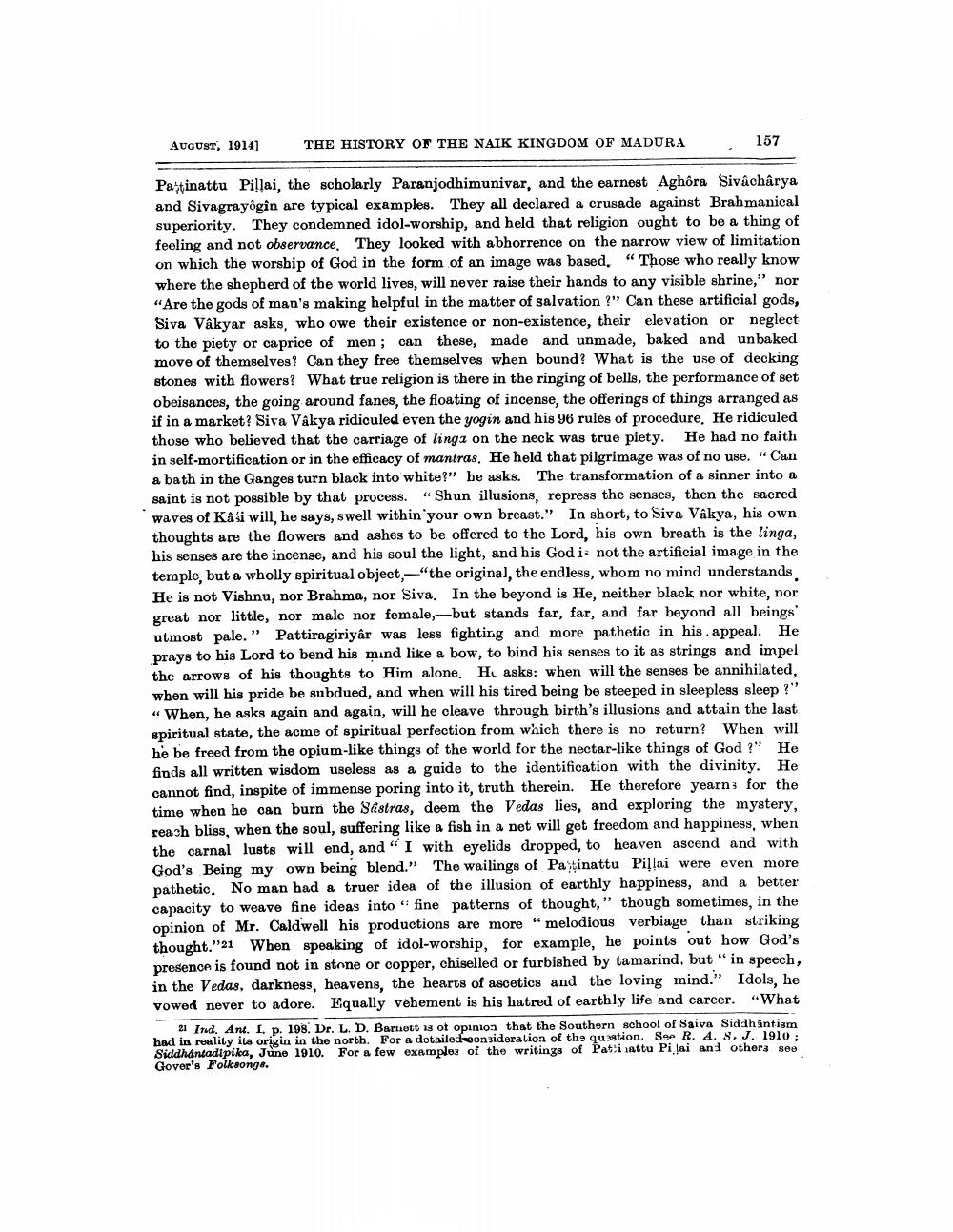________________
AUGUST, 1914]
THE HISTORY OF THE NAIK KINGDOM OF MADURA
157
Patinattu Pillai, the scholarly Paranjodhimunivar, and the earnest Aghôra Sivacharya and Sivagrayôgin are typical examples. They all declared a crusade against Brahmanical superiority. They condemned idol-worship, and held that religion ought to be a thing of feeling and not observance. They looked with abhorrence on the narrow view of limitation on which the worship of God in the form of an image was based, “Those who really know where the shepherd of the world lives, will never raise their hands to any visible shrine," nor "Are the gods of man's making helpful in the matter of salvation ?" Can these artificial gods, Siva Vâkyar asks, who owe their existence or non-existence, their elevation or neglect to the piety or caprice of men; can these, made and unmade, baked and unbaked move of themselves? Can they free themselves when bound? What is the use of decking stones with flowers? What true religion is there in the ringing of bells, the performance of set obeisances, the going around fanes, the floating of incense, the offerings of things arranged as if in a market? Siva Vâkya ridiculed even the yogin and his 96 rules of procedure. He ridiculed those who believed that the carriage of linga on the neck was true piety. He had no faith in self-mortification or in the efficacy of mantras. He held that pilgrimage was of no use. "Can a bath in the Ganges turn black into white?" he asks. The transformation of a sinner into a saint is not possible by that process. "Shun illusions, repress the senses, then the sacred waves of Kasi will, he says, swell within your own breast." In short, to Siva Vâkya, his own thoughts are the flowers and ashes to be offered to the Lord, his own breath is the linga, his senses are the incense, and his soul the light, and his God is not the artificial image in the temple, but a wholly spiritual object, -"the original, the endless, whom no mind understands He is not Vishnu, nor Brahma, nor Siva. In the beyond is He, neither black nor white, nor great nor little, nor male nor female ---but stands far, far, and far beyond all beings' utmost pale.” Pattiragiriyâr was less fighting and more pathetic in his appeal. He prays to his Lord to bend his mind like a bow, to bind his senses to it as strings and impel the arrows of his thoughts to Him alone. H. asks: when will the senses be annihilated, when will his pride be subdued, and when will his tired being be steeped in sleepless sleep?" “When, he asks again and again, will he cleave through birth's illusions and attain the last spiritual state, the acme of spiritual perfection from which there is no return? When will he be freed from the opium-like things of the world for the nectar-like things of God ?" He finds all written wisdom useless as a guide to the identification with the divinity. He cannot find, inspite of immense poring into it, truth therein. He therefore yearns for the time when he can burn the Sastras, deem the Vedas lies, and exploring the mystery, reach bliss, when the soul, suffering like a fish in a net will get freedom and happiness, when the carnal lusts will end, and “I with eyelids dropped, to heaven ascend and with God's Being my own being blend." The wailings of Pa ținattu Pillai were even more pathetic. No man had a truer idea of the illusion of earthly happiness, and a better capacity to weave fine ideas into fine patterns of thought,” though sometimes, in the opinion of Mr. Caldwell his productions are more “ melodious verbiage than striking thought."21 When speaking of idol-worship, for example, he points out how God's presence is found not in stone or copper, chiselled or furbished by tamarind, but" in speech, in the Vedas, darkness, heavens, the hearts of ascetics and the loving mind." Idols, he vowed never to adore. Equally vehement is his hatred of earthly life and career. "What
21 Ind. And. I. p. 198. Dr. L. D. Baruett 13 ot opinion that the Southern school of Saiva Siddhantism had in reality its origin in the north. For a detaile feonsideration of the quation. S R. 4. 8. J. 1910 ; Siddhantadipika, June 1910. For a few examples of the writings of Pasinttu Pilai and others see Gover's Folksonge.




